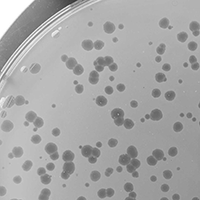Arthrobacter phage Humbaba
Add or modify phage thumbnail images to appear at the top of this page.
Know something about this phage that we don't? Modify its data.
| Detailed Information for Phage Humbaba | |
| Discovery Information | |
| Isolation Host | Arthrobacter pascens NRRL B-1814 |
| Found By | Andrew Cameron |
| Year Found | 2025 |
| Location Found | North Decatur, GA United States |
| Finding Institution | Emory University |
| Program | Science Education Alliance-Phage Hunters Advancing Genomics and Evolutionary Science |
| From enriched soil sample? | No |
| Isolation Temperature | 30°C |
| GPS Coordinates | 33.8058 N, 84.2766 W Map |
| Discovery Notes | Soil was collected from the North Dekalb Mall Community Garden at the outskirts of a vegetable patch in which squash and a few other crops were growing. Soil was rich and loamy, likely commercial agricultural soil. Phage was initially isolated on an equal-parts mix of four different Arthrobacter strains (A. globiformis B-2979, A. pascens B-1814, A. globiformis B-4425, A. humicola B-24478). After initial purification, the phage was found to plaque only on A. pascens 1814 A and A. globiformis B-4425. Subsequent stages of purification were done only with A. pascens B-1814. Prior to naming, this phage was designated “S11.2” throughout isolation and purification. Isolated in the lab of Dr. Nic Vega. |
| Naming Notes | In Mesopotamian mythology, Humbaba is a monstrous figure who serves as the guardian of the Cedar Forest. He is best known for his appearance in the Epic of Gilgamesh, in which the titular character—Gilgamesh, king of Uruk—and his companion Enkidu travel to the Cedar Forest to slay Humbaba and achieve fame and renown. Having subdued the beast, Gilgamesh hesitates, but Enkidu convinces him to finish the job (and quickly, before the gods find out what's going on). In the aftermath of the killing the heroes desecrate the forest in a frenzied rampage. I name this phage in sadness for slain Humbaba and in hope that the natural world will find new guardians in this time of catastrophe. |
| Sequencing Information | |
| Sequencing Complete? | No |
| Genome length (bp) | Unknown |
| Character of genome ends | Unknown |
| Fasta file available? | No |
| Characterization | |
| Cluster | Unclustered |
| Subcluster | -- |
| Annotating Institution | Unknown or unassigned |
| Annotation Status | Not sequenced |
| Plaque Notes | Plaques vary in size, but typically do not exceed 3mm in diameter. Round, with slight irregularities in shape. Clear in the center, with some turbidity around the margins. |
| Has been Phamerated? | No |
| Publication Info | |
| Uploaded to GenBank? | No |
| GenBank Accession | None yet |
| Refseq Number | None yet |
| Archiving Info | |
| Archiving status | Not in Pitt Archives |
| Available Files | |
| Plaque Picture | Download |
